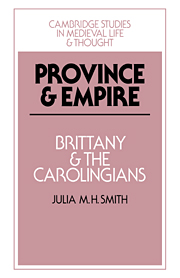Book contents
- Frontmatter
- Contents
- List of illustrations
- Acknowledgements
- List of abbreviations
- Note on nomenclature
- 1 Neustria, Brittany, and northern Aquitaine
- 2 Redon and environs
- Introduction
- 1 Settlement and society in dark age Brittany
- 2 Neustria and the Breton march
- 3 The Bretons in the Christian empire of Louis the Pious
- 4 Carolingian hegemony and Breton revolts, 840–874
- 5 An anatomy of power
- 6 Churches and learning in Carolingian Brittany
- 7 The end of Carolingian Brittany
- List of manuscripts cited
- Bibliography
- Index
- Cambridge studies in medieval life and thought Fourth series
3 - The Bretons in the Christian empire of Louis the Pious
Published online by Cambridge University Press: 26 October 2009
- Frontmatter
- Contents
- List of illustrations
- Acknowledgements
- List of abbreviations
- Note on nomenclature
- 1 Neustria, Brittany, and northern Aquitaine
- 2 Redon and environs
- Introduction
- 1 Settlement and society in dark age Brittany
- 2 Neustria and the Breton march
- 3 The Bretons in the Christian empire of Louis the Pious
- 4 Carolingian hegemony and Breton revolts, 840–874
- 5 An anatomy of power
- 6 Churches and learning in Carolingian Brittany
- 7 The end of Carolingian Brittany
- List of manuscripts cited
- Bibliography
- Index
- Cambridge studies in medieval life and thought Fourth series
Summary
Charlemagne died in 814. By accident, not design, he passed on his empire to a single heir, his only surviving son Louis the Pious. Louis had had a thorough training for rulership: as subking of Aquitaine since childhood, and as a participant on campaigns against the Avars, Saxons, and Beneventans. On his accession, he brought with him to Aachen new men and new ideas, and, above all, a renewed commitment to promoting Christian values and beliefs. Where Charlemagne had been hailed as David, Louis the Pious was Solomon; to his father's Constantine he was Theodosius. From Louis' own close family to the distant frontiers of his empire, everyone was to be touched by his vision of Christian peace and concord: ‘You are the peace of the world’, declared Amalarius of Metz. A great programme of reforming legislation in the opening years of his reign set out the goals and the ways to achieve them. The keystone was the Ordinatio Imperii of 817, in which, having crowned his eldest son Lothar as co-emperor, and made provisions for the succession which would establish his younger sons Louis and Pippin in subordinate kingships, he regulated the conduct of the three brothers towards each other, and established an ideal of fraternal co-operation, Christian charity, and peace for all people.
The British Isles apart, Louis' empire was coterminous with Latin Christendom.
- Type
- Chapter
- Information
- Province and EmpireBrittany and the Carolingians, pp. 60 - 85Publisher: Cambridge University PressPrint publication year: 1992



